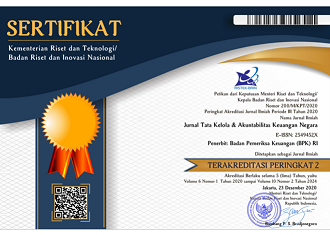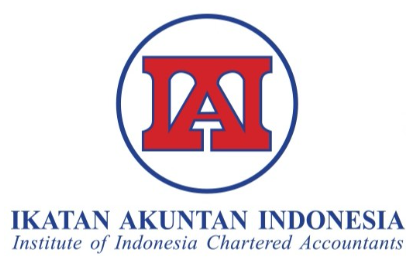The effect of audit opinions, implementation of audit recommendations, and findings of state losses on corruption levels in the ministries and institutions of the Republic of Indonesia
DOI:
https://doi.org/10.28986/jtaken.v7i1.471Keywords:
audit opinion, recommendation, state losses, corruptionAbstract
The prevalence of corruption in Indonesia is increasing every year. This fact has further undermined public confidence to strengthen governance and is a critical barrier to national development. This study aims to empirically examine the individual and combined impact of audit opinions, the implementation of audit recommendations, and findings of state losses by the Indonesian Supreme Audit Board (BPK) on the prevalence of corruption in ministries and institutions in the Republic of Indonesia. Using multiple linear regression analysis, this study used a purposive sampling method and investigated 72 ministries using secondary data from 2014 to 2017 obtained from BPK and the Corruption Eradication Commission of the Republic of Indonesia (KPK). This study indicates that audit opinions and the implementation of audit recommendations do not affect corruption in Indonesian ministries and institutions. In contrast, findings of state losses do have an influence. The combination of audit opinions, implementation of audit recommendations, and findings of simultaneous state losses do not affect corruption cases in Indonesian ministries and institutions. BPK can use the results of this study to formulate approaches and recommendations for auditing government financial reports that have a strong correlation with corruption eradication. Moreover, KPK needs to be more vigorous in its efforts to eradicate corruption, including establishing closer cooperation with BPK because the results of this research show that findings of state losses by BPK are closely related to corruption cases.
References
Barro, R. J. (1991). Economic growth in a cross-section of countries. The Quarterly Journal of Economics, 106(2), 407–443. DOI: 10.2307/2937943.
Bastian, I. (2010). Akuntansi sektor publik: Suatu pengantar (Edisi Ketiga). Jakarta: Penerbit Erlangga.
Blume, L., & Voigt, S. (2011). Does the organizational design of supreme audit institutions matter? A cross-country assessment. European Journal of Political Economy, 27(2), 215–229.
Bologna, J. T. S. (2006). Fraud auditing and forensic accounting. New Jersey: John Wiley & Sons Inc.
BPK RI. (2011). Opini WTP tidak menjamin tidak ada korupsi. Retrieved from https://www.bpk.go.id/news/opini-wtp-tidak-menjamin-tidak-ada-korupsi
BPK RI. (2014). Ikhtisar Hasil Pemeriksaan Semester (IHPS) I Tahun 2014 (Summary of Semester Audit Results I Year 2014). Retrieved from https://www.bpk.go.id/ihps
BPK RI. (2015). Ikhtisar Hasil Pemeriksaan Semester (IHPS) I Tahun 2015 (Summary of Semester Audit Results I Year 2015). Retrieved from https://www.bpk.go.id/ihps
BPK RI. (2016). Ikhtisar Hasil Pemeriksaan Semester (IHPS) I Tahun 2016 (Summary of Semester Audit Results I Year 2016). Retrieved from https://www.bpk.go.id/ihps
BPK RI. (2017a). Ikhtisar Hasil Pemeriksaan Semester (IHPS) II Tahun 2015 (Summary of Semester Audit Results I Year 2017). Retrieved from https://www.bpk.go.id/ihps
BPK RI. (2017b). BPK Regulation Number 1 Year 2017 concerning State Financial Audit Standards (Peraturan BPK RI Nomor 1 Tahun 2017 tentang Standar Pemeriksaan Keuangan Negara). Retrieved from https://www.bpk.go.id/page/standar-pemeriksaan-keuangan-negara
BPK RI. (2017c). BPK Regulation Number 2 Year 2017 concerning Monitoring of the Follow-Up Implementation of BPK Audit Results Recommendations(Peraturan BPK RI Nomor 2 Tahun 2017 tentang Pemantauan Pelaksanaan Tindak Lanjut Rekomendasi Hasil Pemeriksaan BPK). Retrieved from https://peraturan.bpk.go.id/Home/Details/31514/peraturan-bpk-no-2-tahun-2017
BPK RI. (2019, July). Pemeriksaan keuangan negara oleh BPK RI. Paper presented at the Socialization with Indonesian Citizen, Kuwait City, Kuwait.
Chen, J., Cumming, D., Hou, W., & Lee, E. (2013). Executive integrity, audit opinion, and fraud in Chinese listed firms. Emerging Markets Review, 15(C), 72-91. DOI: 10.1016/j.ememar.2012.12.003
Eisenhardt, K. M. (1989). Agency theory: An assessment and review. The Academy of management review, 14(1), 57-74. DOI: 10.2307/258191
Gong, T. (2010). Auditing, accountability, and corruption in China: Prospects and problems. Journal of Public Administration, 2, 69–84.
Gould, D. J., & Amaro-Reyes, J. A. (1983). “The Effects of Corruption on Administrative Performance,” World Bank Staff Working Paper No. 580, Washington, DC: The World Bank. Retrieved from http://documents1.worldbank.org/curated/en/799981468762327213/pdf/multi-page.pdf
Guy. D. M., & Sullivan, J. D. (1988). The expectation gap auditing standards. The Journal of Accountancy, 16(5), 36-46.
Heriningsih, S., & Marita. (2013). Pengaruh opini audit dan kinerja keuangan pemerintah daerah terhadap tingkat korupsi
Pemda (studi empiris pada PEMKAB/PEMKOT di pulau Jawa). Buletin Ekonomi, 11(1), 1-86.
Husna, N., Rahayu, S., & Triyanto, D. N. (2017). Pengaruh opini audit dan temuan audit terhadap tingkat korupsi (studi pada pemerintah daerah di Indonesia tahun 2016). E-proceeding of Management, 4(2), 1637-1642.
Hu, Z. Y. (2005). Promoting the state audit system to curb corruption and rent-seeking. Economy & Audit Study, 1, 18–22 (in Chinese).
Irfan, M. (2019). Penyalahgunaan wewenang paling merugikan negara. Media Indonesia. 9 Februari 2019. Retrieved from https://mediaindonesia.com/politik-dan-hukum/215875/penyalahgunaan-wewenangpaling-rugikan-negara.
Komisi Pemberantasan Korupsi. (2018). Penanganan TPK berdasarkan instansi. Retrieved from https://acch.kpk.go.id/berdasarkan-instansi.
Konrath, L. F. (2002). Auditing: A risk analysis approach (5th edition). Canada: South-Western Thomson Learning.
Kyei, B. A. (2016). An evaluation of audit report and recommendations of Wenchi Municipal Assembly. Ghana: Department of Accounting and Finance Kwame Nkrumah University.
Law of The Republic of Indonesia Number 20 of 2001 concerning Amendment of Law Number 31 of 1999 concerning Eradication of The Crime of Corruption (Undang-Undang Nomor 20 Tahun 2001 tentang Perubahan atas UU Nomor 31 Tahun 1999 tentangPemberantasan Tindak Pidana Korupsi). Retrieved from https://jdih.bssn.go.id/arsip-hukum/uu-nomor-20-tahun-2001-tentang-pemberantasan-tindak-pidana-korupsi
Law of The Republic of Indonesia Number 1 of 2004 concerning State Treasury (Undang-undang Nomor 1 Tahun 2004 tentang Perbendaharaan Negara). Retrieved from https://www.kemenkeu.go.id/sites/default/files/pdf-peraturan/ UU%20NOMOR%201%20TAHUN%202004.pdf
Law of The Republic of Indonesia Number 15 of 2004 concerning The State Financial Management and Accountability Audit (Undang-undang Nomor 15 Tahun 2004 tentang Pemeriksaan Pengelolaan dan Tanggung Jawab Keuangan Negara). Retrieved from https://www.bpk.go.id/assets/files/storage/2013/12/file_storage_1386158654.pdf
Law of The Republic of Indonesia Number 15 of 2006 concerning The Audit Board (Undang-undang Nomor 15 Tahun 2006 tentang Badan Pemeriksa Keuangan). Retrieved from http://www.bpk.go.id/assets/files/storage/2014/06/file_storage_1404095485.pdf
Liu, J., & Lin, B. (2012). Government auditing and corruption control: Evidence from China’s provincial panel data. China Journal of Accounting Research, 5(2), 163-186. DOI: 10.1016/j.cjar.2012.01.002
Mauro, P. (1995). Corruption and growth. The Quarterly Journal of Economics, 110(3), 681–712. DOI: 10.2307/2946696
Mo, P. H. (2001). Corruption and economic growth. Journal of Comparative Economics, 29(1), 66-79. DOI: 10.1006/jcec.2000.1703
Downloads
Submitted
Accepted
Published
How to Cite
Issue
Section
License

Jurnal Tata Kelola dan Akuntabilitas Keuangan Negara is licensed under
a Creative Commons Attribution-ShareAlike 4.0 International License




















